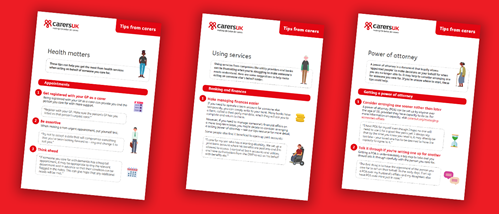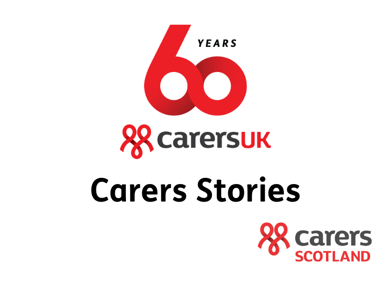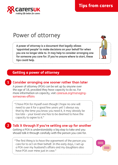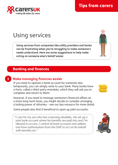Acting on someone else's behalf
It can be difficult to know where to start if you need to look after a relative's or friend's affairs when they need a lot of support or are unable to manage their own.
This section explains different ways to navigate the system and how to get support and assistance from service providers. We also introduce different options around planning for the future to enable you to feel prepared to make the right decisions when necessary.
Managing someone's affairs animation
Watch the British Sign Language version of this video.
What is a power of attorney?
A power of attorney is a legal document that allows you (as the donor) to appoint one of more people to make important decisions on your behalf. It gives someone authority to look after your affairs, should you be unable to, either now or in the future.
Frequently asked questions
This is a way of enabling someone to act with legal authority to make decisions on your behalf should you be unable to. It involves following steps to set up a legal document to grant this authority and there are several different types of power of attorney you can choose.
In England and Wales
There are two main types:
- Lasting Power of Attorney (LPA) – for Health and Welfare (can only be used when someone has lost their ability to make their own decisions, known as ‘mental capacity’)
- Lasting Power of Attorney (LPA) – for Property and Financial Affairs (can be used before the person loses their ability to make their own decisions, if they wish)
In Scotland
There are two main types:
- Power of attorney for property and financial affairs – also known as a ‘continuing power of attorney’ (can be used before the person loses their ability to make their own decisions, if they wish
- Power of attorney for welfare - can only be used when someone has lost their ability to make their own decisions, known as 'mental capacity'
In Northern Ireland
There is one main type:
- An Enduring Power of Attorney can be given for property and financial affairs.
- Unlike in other parts of the UK, it is not possible to set up a health and welfare power of attorney in Northern Ireland. (It can be used immediately unless otherwise specified in the document.)
A lasting power of attorney can ensure that a person’s wishes are respected, should they be in a position where they are no longer able to express their own wishes directly.
It can provide clarity in emergencies and can avoid stressful decision-making at a time of crisis. It can also help to overcome certain barriers when dealing with professionals at an already difficult time.
Anyone who is 18 or over and has mental capacity can make a power of attorney even if they have specialist needs. You can apply here https://www.gov.uk/power-of-attorney
The Office for the Public Guardian have FAQs and a guide to help here: Your questions answered: Completing forms – Office of the Public Guardian
In England and Wales, it currently costs £92 to register each type of lasting power of attorney (so £184 to register both 'Finance and Property' and 'Health and Welfare').
In Scotland, it involves an application fee of £96 to register a Continuing and/or Welfare Power of Attorney. The cost to register an Enduring Power of Attorney in Northern Ireland is currently £180.
There may be additional costs if you need to amend the forms or if you choose to use a solicitor to help complete them. Their fees can also vary.
Are any discounts available?
If you are on a low income, it may be possible to apply for a discount or exemption.
You can see if you are eligible by applying to the Office of the Public Guardian, the authority that oversees lasting power of attorneys: https://www.gov.uk/government/publications/power-of-attorney-fees. In Scotland, visit: Fee exemption.
If using a solicitor, in Scotland, you can see if you qualify for legal aid here: Eligibility estimators - Scottish Legal Aid Board
In Northern Ireland, visit: https://www.nidirect.gov.uk/articles/legal-aid
And in England and Wales, visit: https://www.gov.uk/legal-aid
Can I get this in an alternative format?
Yes – you can email: customerservices@publicguardian.gov.uk and include your name, address and telephone number to request the document in large print.
There are many legal and specialist terms used in this process that may not be very clear to many of us.
The Office for the Public Guardian have developed a jargon buster to help here: https://publicguardian.blog.gov.uk/2023/07/27/tackling-our-terminology/
Video guide
Carers UK adviser, Priya explains what a power of attorney is in more detail and why it might be helpful to set one up as soon as possible for yourself or for someone you care for (or both). Please note, some of the names may differ depending on where you live.
Terms and processes can differ depending on where you live in the UK, so we have provided some nation-specific pages on this topic to help you explore what would apply to your situation in further detail.
Tips from carers

Need help to arrange services on behalf of the person(s) you care for?
Based on carers' insights and experiences, our three factsheets share tips from carers on managing health matters, power of attorney, and dealing with services from banks to utility providers. Download using the buttons below.
Please note that these factsheets are based on carers' personal experiences and are for general information purposes. Information may also vary depending on your UK nation. For more detailed information on your situation, please email our Helpline at advice@carersuk.org
What's the Vulnerability Registration Service?
The Vulnerability Registration Service (VRS) offers support for anyone dealing with challenging circumstances. The service allows you to register your details on a UK database. VRS works with organisations including financial services, utilities and local government to make sure they are aware of your situation.
By registering with VRS, you can flag up to companies that you are a carer and may be acting on someone else’s behalf or that you may be impacted financially or face other challenges resulting from being a carer. You can find out more and register here: the-vrs.com
What else could I sign up to?
You may also be interested in registering for free with the Priority Services Register (or the Medical Customer Care Register in Northern Ireland).
You could potentially apply on behalf of someone you care for if they would be at risk should there be a power cut or disruption to their gas, electricity or water supply. Find out more:
In England, Wales and Scotland – The Priorities Services Register: https://www.thepsr.co.uk/
In Northern Ireland – The Medical Customer Care Register: https://www.nienetworks.co.uk/help-advice/vulnerable-customers/medical-customer-care-register/care-register-sign-up

Carers' tips sheets
Latest updates


National Carer Organisation’s Statement on the Scottish Budget 2026

60th Anniversary Stories: In Praise of Young Carers – Pearls (Poem)
Got a question about caring?
Every day we hear from people who need help with looking after a friend or family member
Become a member for free
Joining Carers UK is free and takes just a few minutes.



